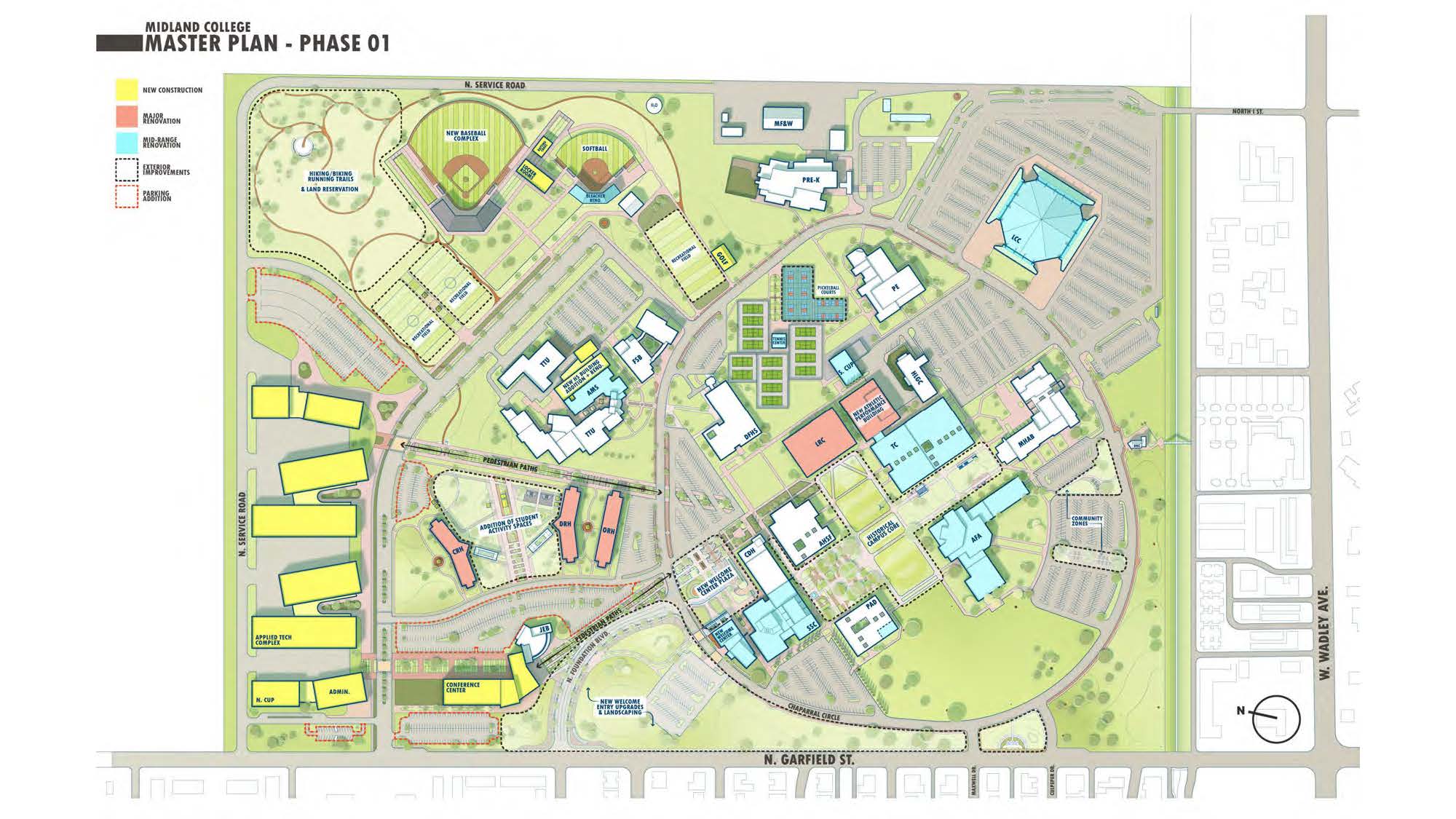 On November 19, 2024, the Midland College administration presented the Board of Trustees
a three-year campus expansion and revitalization plan, including a significant expansion
of its Career and Technical Education (CTE) programs and facilities — a move demanded
by students, energy companies, healthcare providers, and community leaders. The Board
unanimously approved a proposal from Pfluger Architects to provide bond exploration
services to enhance communications planning and community engagement. This significant
step is part of MC's bold vision to address regional workforce needs and expand educational
opportunities through a transformative plan.
Dr. Damon Kennedy, Midland College President, emphasized the pressing need for action.
“Our master plan is the culmination of five years of work beginning with the design
of new instructional programs. Designed to serve dual credit students, recent graduates
seeking degrees or credentials, and adults looking to upskill, these new programs
aim to provide industry partners with a highly skilled workforce.” Midland College
enrollment is currently at a 10-year high. With recent initiatives, including free
dual credit, the college anticipates record enrollment in fall of 2025 and new facilities
would result in more than double the number of students enrolled in the fall of 2020.
Kennedy added, “We’ve identified and assessed the need. We’ve built the programs.
Unfortunately, at a time when industry demand is at an all-time high, we’re turning
students away due to the lack of physical space.”
The three-year action plan is the initial step in the implementation of a 30-year
master plan, which reimagines the campus to align with the growing demands of students,
workforce partners, and the community at large. The highly collaborative plan reflects
over 18 months of engagement with community, ISDs, industry experts, planners, and
architects.
Proposed Projects Include:
- 280,000 sq. ft. Applied Technology Buildings housing energy and heavy industry programming
- 47,000 sq. ft. Health Sciences Facility housing critical programming to support health care
- 53,000 sq. ft. Conference Center to support energy education, college operations, and culinary arts
- Modernization of Legacy Structures and Campus Core with an emphasis on safety and security
- Upgraded Student Housing including flexible living spaces, common kitchens, and study rooms
- Enhanced Community Spaces including recreational fields, tennis, pickleball, and walking trails
A Legacy of Investing in Midland and its People
"Midland College has been the central provider of Career and Technical Education (CTE)
from its beginning, offering programs leading to high-skill, high-wage jobs and working
with MISD and other school districts to provide dual credit CTE classes. While providing
this critical instruction, the College has also provided Kids’ College, College Classics,
cultural events, and transfer courses and programs to generations of Midlanders. All
of this centered on a historic campus open to the community for personal enjoyment,
public events, and recreation.” said Dr. Deana Savage.
As the Permian Basin continues to serve as a central hub fueling the global energy
industry, Midland College must maintain focus on preparing the workforce of the region
to embrace advancing technology and adapt to the ever-changing world. Midland continues
to grow, ever-increasing the demand for a highly qualified and skilled workforce.
The college is a comprehensive center for education in the region and must increase
capacity and modernize for the future, while continuing the college’s legacy of providing
quality education.
"Midland College offers a low-cost, high-reward education with almost immediate return
on investment,” stated Dr. Kennedy. “For instance, an associate degree in Diesel Technology
can yield an $80,000 wage increase in just two years — far exceeding the cost of tuition.
Across all programs, MC boosts employability and earnings for students who then pour
additional dollars back into the regional economy."
Tom Glenn, Vice President of Strategy and Analytics, presented compelling data highlighting
the urgent need for expanded Applied Technology and Health Sciences facilities to
meet the growing demand for skilled workers. "The regional demand gap that exists
across the board for these occupations makes this the ideal time for Midland College
to expand and ensure more students have access to these critical programs," said Glenn.
Midland College remains committed to securing input from the community throughout
this process, ensuring a common vision that reflects the needs of all stakeholders.
With broad-based community support to date, Pfluger Architects will assist the college
in forming a bond advisory committee. This marks Midland College’s first potential
bond initiative since 2005. With community support, the revitalization plan will fuel
the region’s economic growth by providing cutting-edge programs and facilities that
meet the evolving needs of students and industry.
|
